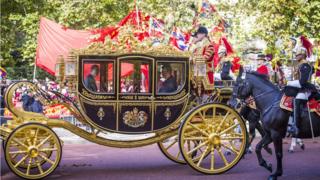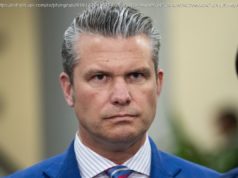 The proposed state visit by new US President Donald Trump to the UK later this year has sparked anger after his administration banned entry for nationals of seven Muslim-majority countries and suspended the US’s refugee programme.
The proposed state visit by new US President Donald Trump to the UK later this year has sparked anger after his administration banned entry for nationals of seven Muslim-majority countries and suspended the US’s refugee programme.
More than a million people have now signed a petition calling for the visit to be cancelled.
But what happens during an official state visit, who decides who gets an invitation, and which other controversial world figures has the Queen hosted during her long reign?
There has been no date set for Mr Trump’s proposed visit, announced during PM Theresa May’s visit to the US, last week.
When asked why Mr Trump was invited so soon after taking office, Mrs May’s spokesman said: „There is no set timing that a president needs to be in office before they receive, or don’t receive, an invitation for a state visit. “
But public discontent around controversial guests is nothing new.
Recent protests have focused on heads of state from countries known for poor human rights records, such as China and Saudi Arabia.
Despite the outcry, those visits went ahead.
When: October 2015
Why was visit controversial: The country’s human rights records and Chinese rule in Tibet. Campaigners said authorities targeted activists and their family members with harassment, imprisonment and torture. Rights groups also cited persecution of people for their religious beliefs, discrimination against ethnic minorities, torture, tight restrictions on media and limited access to foreign TV and publications and death penalty. Critics also pointed out job losses in the UK steel sector which had been partially blamed on China selling steel in the global market at a much cheaper price.
Who is President Xi Jinping?
Human rights: What is China accused of?
When: October 2007
Why: The country’s human rights records. There were also calls for the reopening of a corruption inquiry into a massive arms deal. Protesters shouted „shame on you“ as the royal procession passed along The Mall in central London.
Red carpet welcome for Saudi king
When: November 2005
Why: The country’s human rights records, Taiwan and Chinese rule in Tibet.
President Hu booed at Guildhall
When: November 2003
Why: The US-led war in Iraq. Some 100,000 demonstrators, according to police, culminated in London’s Trafalgar Square, where an effigy of Mr Bush was toppled, echoing scenes from the fall of a statue of former Iraqi leader Saddam Hussein in Baghdad.
Thousands protest against Bush
When: October 1971
Why: He was Japan’s emperor during World War II. Veterans and former prisoners of war, angry at Japan’s brutal militaristic past, protested by standing in silence as his carriage drove past. Some wore red gloves to symbolise war deaths while others whistled the popular World War II march, Colonel Bogey.
1978: Romanian President Nicolae Ceauşescu
1994: Zimbabwean President Robert Mugabe
1991: Egyptian President Hosni Mubarak






